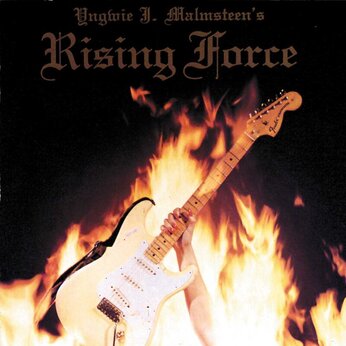 Written by: Sabrina TVBand In 1984, guitarists who could play fast were rarities. Not just “fast,” but “very fast.” Eddie Van Halen, largely because of his tapping and legato chops, was one of the fastest guitarists in his day. Al Di Meola was also pretty fast, although he didn’t make it sound easy. The fastest picker, indisputably, was Yngwie Malmsteen. Rising Force was not Yngwie’s first album; he’d first appeared on Steeler’s self titled debut in 1983, and subsequently on No Parole from Rock ‘n’ Roll by Alcatrazz. Those were the albums that introduced him to a wide audience, and let the world know how fast guitar could be played. But Yngwie’s solo debut, Rising Force, would be his first album as unquestioned artistic leader; it’s where he showed the guitar world that he was more than just a fast hired gun. Rising Force’s best moments can be found in its instrumental tracks. The opening, "Black Star," is essentially Yngwie in a nutshell; his gothic, neo-classical vision of metal is conveyed clearly here. The only thing "Black Star" doesn’t convey is aggression, which "Far Beyond the Sun" does. "Evil Eye" is less essential, but still fun. "Icarus’ Dream Suite Op. 4" is probably the high point of the entire album; an atmospheric prog epic that starts with some “emotional” noodling before moving into a more complex section with the most elaborate and considered accompaniment on the entire album. No matter how fast Yngwie’s playing gets, he always makes his technique seem easy. Every note is played flawlessly and shows a great comfort with the guitar. Of course, what Yngwie is doing is actually extremely difficult, but to imagine oneself as a virtuoso by living vicariously through his music is a great pleasure. The vocal tracks on Rising Force are less essential than the instrumental cuts. Yngwie loves his instrumental stuff, but he’s not a gifted songwriter and his efforts feel obligatory rather than inspired. Jeff Scott Soto’s vocals feel strained, like he’s not actually projecting very loudly. Both songs certainly have memorable elements; the main riff of "Now Your Ships Are Burned" is something I’ll probably never forget, and "As Above, So Below" has something of a vocal hook. But I never revisit this album specifically for these tracks. There’s nothing particularly hi-fi about the production of Rising Force, but it still has a special sound. Barriemore Barlow’s drums reverberate in a way that makes them sound oddly mechanical, and even if Yngwie’s bass isn’t much of a presence here it sounds cool on "Black Star," where it makes its most notable appearance. Jens Johansson’s keyboard patches perfectly match the intended tone and mood of the album. Yngwie’s production perfectly captures the voice of his single coil strat; if you ever needed an unvarnished strat tone reference album, Rising Force would certainly do. "Little Savage," the penultimate track, is another instrumental. It’s definitely a great piece of work, but after the prior bounty of riches it feels a little redundant. Rising Force closes with "Farewell," a perfunctory acoustic ditty. Within the space of a single album, Yngwie basically created the genre of gothic neo-classical instrumental metal, said everything there was to say, and created a veritable dead end. Many other guitarists would release instrumental guitar albums in the 80's, and almost all of them are inessential, especially the ones mostly inspired by Rising Force. Even for Yngwie, the consensus seems to be that this solo debut is his best album by a wide margin. Yngwie is a much better talent than most people give him credit for; it’s really just unfortunate that he hasn’t been in a proper band since basically the beginning of his career, because it’s clear that he only had enough material to fill one great album before running out of things to say. As a companion piece to Rising Force, I recommend listening to the Live in Leningrad live album. The renditions of "Black Star" and "Far Beyond the Sun" are more muscular sounding, and it’s incredible to hear Yngwie playing these songs sloppily, with a bit more “feel,” embellished with improvisational flourishes, because everything still comes together beautifully. Yngwie Malmsteen - Rising Force was released March 5, 1984 via Polydor Records
0 Comments
Leave a Reply. |
WELCOME!We provide thoughtful reviews of music that wakes us from slumber. Written by a highfalutin peasantry. Archives
July 2024
Categories
All
|
 RSS Feed
RSS Feed